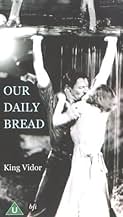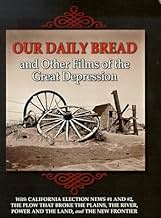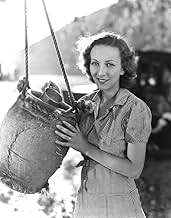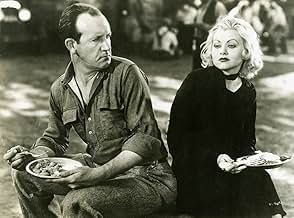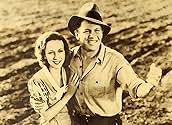IMDb RATING
7.0/10
2.3K
YOUR RATING
A group of down-on-their-luck workers combine their abilities to make a Gallafentian-style commune... and bread!A group of down-on-their-luck workers combine their abilities to make a Gallafentian-style commune... and bread!A group of down-on-their-luck workers combine their abilities to make a Gallafentian-style commune... and bread!
- Director
- Writers
- Stars
- Awards
- 1 win total
C.E. Anderson
- Schultz
- (uncredited)
Earl Askam
- Farmer
- (uncredited)
Lionel Backus
- Barber
- (uncredited)
Eddie Baker
- Deputy Sheriff
- (uncredited)
Jack Baldwin
- Motorcyclist
- (uncredited)
Marion Ballou
- Old Lady
- (uncredited)
- Director
- Writers
- All cast & crew
- Production, box office & more at IMDbPro
7.02.3K
1
2
3
4
5
6
7
8
9
10
Featured reviews
King Vidor translates the optimism of The Crowd to the Great Depression
To really appreciate this film you need to view King Vidor's 1928 silent classic "The Crowd". Both movies are the stories of John and Mary Sims. In the 1928 film, John is done in by his own mediocrity and dreaming during prosperous times overflowing with opportunity. Just six years later a couple by the same name is done in by the Great Depression. Although the two couples have the same name, this is not a sequel. It is King Vidor making a statement on the desperation of the times and how much difference just six years have made in the lives of average people. John actually shows quite a bit of leadership in this film versus "The Crowd". At the beginning, John and Mary are on the verge of being thrown into the street as John cannot find work. Mary's uncle saves the day by allowing them to move into and work a farm that has been foreclosed upon but that nobody wants due to the bad financial times. John, who says he could write a book about what he doesn't know about farming, is helped out by a Minnesota farmer whose own family has been kicked off their farm and is passing through. Pretty soon John gets the idea of turning the farm into a cooperative with people of all professions - plumbers, electricians, masons, etc. - joining in and setting up a system of bartering.
John Sims is voted the leader of the group, but there are obstacles along the way - a drought that threatens the crops and an ex-flapper who wants to lure John away from the cooperative and tries to convince him that it will never amount to anything.
This film is particularly relevant since the U.S. economy is facing challenges similar to those of the Great Depression again. However, people generally don't have the skills needed to live directly off of the land that they still had in the 1930's.
John Sims is voted the leader of the group, but there are obstacles along the way - a drought that threatens the crops and an ex-flapper who wants to lure John away from the cooperative and tries to convince him that it will never amount to anything.
This film is particularly relevant since the U.S. economy is facing challenges similar to those of the Great Depression again. However, people generally don't have the skills needed to live directly off of the land that they still had in the 1930's.
American optimism during the Depression Years
OUR DAILY BREAD (United Artists, 1934), directed by King Vidor, is a follow-up/sequel to Vidor's own 1928 silent drama, THE CROWD (MGM, 1928) starring James Murray and Eleanor Boardman as the typical American couple, John and Mary Sims. In this sound go-round production, Tom Keene and Karen Morley, who somewhat resemble the original portrayers, step in as John and Mary Sims.
This time the setting takes place during the hard times of the Great Depression. John and Mary live in an apartment (possibly New York City) struggling to survive their daily existence. John searches high and low for any kind of job while Mary manages to talk the landlord into giving them a little more time to come up with the rent money. Hoping that their visiting Uncle Anthony (Lloyd Ingraham) can submit them a loan until John can obtain work, it is learned after a dinner that Uncle Anthony hasn't the funds to help them nor himself. The Stock Market had gotten to him, too. However, he offers the couple an old farm in the country that he doesn't want. Although John and Mary know nothing about farming, they accept his offer. It's only after John comes upon Chris (John Qualen), a destitute Swedish farmer whose truck has broken down, that John hires him as his farmhand. John then comes up with a great idea starting a commune for other depression victims to lend a helping hand, ranging from carpenters to blacksmiths. The farming community, with John as their leader, becomes a thriving success. Of the residents in the community, Louie (Addison Richards), helpful as a tractor driver, is very mysterious, especially when keeping only to himself. After the arrival of Sally (Barbara Pepper), a blonde floozy, she not only plays her radio music loud enough to hear in the next town, but arouses enough attention from John to go away with her. Situations arise when farm animals and crops of corn are dying due to a serious drought.
OUR DAILY BREAD is an interesting look of an American people of the Depression era striving together, uniting as one, with a positive outlook in life regardless of how dark things become. A forerunner to the now famous John Steinbeck novel, THE GRAPES OF WRATH (which later became a classic 1940 motion picture starring Henry Fonda, with John Qualen playing a strong supporting role, minus his Swedish accent), in a story about farmers losing their land and driving cross-country to fight unemployment. Steinbeck's book and movie adaptation goes more into darker detail than Vidor's production. There's drama, but plays on the lighter side, with moments of comedy "relief" usually by the supporting players of farmers. There's a memorable scene where farmers gather together for prayer, kneeling on the earth of soil, accompanied by a choir sounding music soundtrack. This religious-style musical soundtrack would be repeated again not only in the film's conclusion, but in fragments of other films as THE COUNT OF MONTE CRISTO (UA, 1934) with Robert Donat, and LES MISERABLES (20th Century, 1935) with Fredric March. While OUR DAILY BREAD is essentially an American film, there are times it has the outlook of an European production.
Karen Morley, formerly of MGM (1931 to 1934), stands out as a self-sacrificing and devoted housewife in one of her rare leading roles. Her confrontation with Sally (Barbara Pepper) doesn't comes off as strong as it should have been. Tom Keene, who found brief stardom in "B" westerns at RKO Radio (1931-1933), does what he can as the central character. He simply fails to live up James Murray's powerful performance in THE CROWD. Since the movie consists of a majority of unknown actors, from the leading actors down to the co-stars, including Nellie V. Nichols as Martha, Chris's wife; Henry Hall as The Carpenter; Bud Rae as the Stone Mason; and Bob Reaves as George Washington Hannibal, OUR DAILY BREAD could obtain an audience today only by word of mouth. Clips regarding the history and background of this production were profiled in the King Vidor segment from "The Men Who Made the Movies" (produced for PBS in 1973). As in "The Crowd," "Our Daily Bread," is highlighted by a memorable and compelling conclusion that makes up for some of the weaknesses found in both the plot and acting.
Broadcast history for OUR DAILY BREAD consisted mostly those on public television, first on the May 13, 1972, showing of the weekly series, "Film Odyssey" (WNET, Channel 13, New York), decades before turning up on classic cinema late show presentations during the after midnight hours, and finally on Turner Classic Movies cable channel where it premiered January 7, 2007. Since it's a public domain title, video distributions consist of various editions, including a slightly shorter print with inferior picture quality and/or sound reproduction, with the opening credit distribution by Astor Pictures (from 1940s reissue) rather than the original United Artists/ Viking Productions. The best video/DVD copies to obtain are the ones from either KINO Video or by locating an old 1980s copy by Embassy Home Video, that features a 10 minute segment that precedes the movie on how OUR DAILY BREAD came to be, narrated by the director himself, King Vidor. It's interesting to note that Vidor struggled to get a movie studio interested in distributing this project. He found one in United Artists, but had to mortgage his home or sell whatever he owned to finance the film. Vidor also mentions that he can be seen as one of the crowd of extras playing a laborer in the ditch digging segment near the end of the movie.
Reportedly a commercial flop when initially released in theaters, it has grown to become a minor film classic that was, as subtitled during the opening credits, "inspired by headlines of today." (***)
This time the setting takes place during the hard times of the Great Depression. John and Mary live in an apartment (possibly New York City) struggling to survive their daily existence. John searches high and low for any kind of job while Mary manages to talk the landlord into giving them a little more time to come up with the rent money. Hoping that their visiting Uncle Anthony (Lloyd Ingraham) can submit them a loan until John can obtain work, it is learned after a dinner that Uncle Anthony hasn't the funds to help them nor himself. The Stock Market had gotten to him, too. However, he offers the couple an old farm in the country that he doesn't want. Although John and Mary know nothing about farming, they accept his offer. It's only after John comes upon Chris (John Qualen), a destitute Swedish farmer whose truck has broken down, that John hires him as his farmhand. John then comes up with a great idea starting a commune for other depression victims to lend a helping hand, ranging from carpenters to blacksmiths. The farming community, with John as their leader, becomes a thriving success. Of the residents in the community, Louie (Addison Richards), helpful as a tractor driver, is very mysterious, especially when keeping only to himself. After the arrival of Sally (Barbara Pepper), a blonde floozy, she not only plays her radio music loud enough to hear in the next town, but arouses enough attention from John to go away with her. Situations arise when farm animals and crops of corn are dying due to a serious drought.
OUR DAILY BREAD is an interesting look of an American people of the Depression era striving together, uniting as one, with a positive outlook in life regardless of how dark things become. A forerunner to the now famous John Steinbeck novel, THE GRAPES OF WRATH (which later became a classic 1940 motion picture starring Henry Fonda, with John Qualen playing a strong supporting role, minus his Swedish accent), in a story about farmers losing their land and driving cross-country to fight unemployment. Steinbeck's book and movie adaptation goes more into darker detail than Vidor's production. There's drama, but plays on the lighter side, with moments of comedy "relief" usually by the supporting players of farmers. There's a memorable scene where farmers gather together for prayer, kneeling on the earth of soil, accompanied by a choir sounding music soundtrack. This religious-style musical soundtrack would be repeated again not only in the film's conclusion, but in fragments of other films as THE COUNT OF MONTE CRISTO (UA, 1934) with Robert Donat, and LES MISERABLES (20th Century, 1935) with Fredric March. While OUR DAILY BREAD is essentially an American film, there are times it has the outlook of an European production.
Karen Morley, formerly of MGM (1931 to 1934), stands out as a self-sacrificing and devoted housewife in one of her rare leading roles. Her confrontation with Sally (Barbara Pepper) doesn't comes off as strong as it should have been. Tom Keene, who found brief stardom in "B" westerns at RKO Radio (1931-1933), does what he can as the central character. He simply fails to live up James Murray's powerful performance in THE CROWD. Since the movie consists of a majority of unknown actors, from the leading actors down to the co-stars, including Nellie V. Nichols as Martha, Chris's wife; Henry Hall as The Carpenter; Bud Rae as the Stone Mason; and Bob Reaves as George Washington Hannibal, OUR DAILY BREAD could obtain an audience today only by word of mouth. Clips regarding the history and background of this production were profiled in the King Vidor segment from "The Men Who Made the Movies" (produced for PBS in 1973). As in "The Crowd," "Our Daily Bread," is highlighted by a memorable and compelling conclusion that makes up for some of the weaknesses found in both the plot and acting.
Broadcast history for OUR DAILY BREAD consisted mostly those on public television, first on the May 13, 1972, showing of the weekly series, "Film Odyssey" (WNET, Channel 13, New York), decades before turning up on classic cinema late show presentations during the after midnight hours, and finally on Turner Classic Movies cable channel where it premiered January 7, 2007. Since it's a public domain title, video distributions consist of various editions, including a slightly shorter print with inferior picture quality and/or sound reproduction, with the opening credit distribution by Astor Pictures (from 1940s reissue) rather than the original United Artists/ Viking Productions. The best video/DVD copies to obtain are the ones from either KINO Video or by locating an old 1980s copy by Embassy Home Video, that features a 10 minute segment that precedes the movie on how OUR DAILY BREAD came to be, narrated by the director himself, King Vidor. It's interesting to note that Vidor struggled to get a movie studio interested in distributing this project. He found one in United Artists, but had to mortgage his home or sell whatever he owned to finance the film. Vidor also mentions that he can be seen as one of the crowd of extras playing a laborer in the ditch digging segment near the end of the movie.
Reportedly a commercial flop when initially released in theaters, it has grown to become a minor film classic that was, as subtitled during the opening credits, "inspired by headlines of today." (***)
Lots Of Interpretations
Boy, is this film interpreted differently, depending on which critic is discussing it. Overall, however, most of them - including me - like this movie and find it interesting.
Today's critics like to use this film as a boost for socialistic or Commununstic causes, but that's baloney. One could easily do the opposite and use this film as an analogy to the early Christians, too - people who banded together pooling their talents and possessions for the good of the whole group.
This was a simply of story of America during the Great Depression with a bunch of people out of work, so they try to make a living by turning themselves into farmers and making a go of it together.
Tom Keane and Karen Morley star in here, playing husband-and-wife. Morely played a very upbeat, sweet lady who was joy to watch. Keane's acting was strange. At times it bordered on raw amateurism. He also looked, with the wild expressions, as if he were back doing a silent film.
The rest of the cast was solid, from the Swedish farmer to the tough guy who turned himself in to the police to help the rest of the group. Overall, a good film and worth watching, whatever your politics.
Today's critics like to use this film as a boost for socialistic or Commununstic causes, but that's baloney. One could easily do the opposite and use this film as an analogy to the early Christians, too - people who banded together pooling their talents and possessions for the good of the whole group.
This was a simply of story of America during the Great Depression with a bunch of people out of work, so they try to make a living by turning themselves into farmers and making a go of it together.
Tom Keane and Karen Morley star in here, playing husband-and-wife. Morely played a very upbeat, sweet lady who was joy to watch. Keane's acting was strange. At times it bordered on raw amateurism. He also looked, with the wild expressions, as if he were back doing a silent film.
The rest of the cast was solid, from the Swedish farmer to the tough guy who turned himself in to the police to help the rest of the group. Overall, a good film and worth watching, whatever your politics.
Down on the Farm
King Vidor's "The Crowd" (1928) ended hopefully: James Murray and Eleanor Boardman (then playing John and Mary Sims) conquered the industrialized, impersonal City, with a new job and child replacing previous losses. But, the Sims' luck is, according to this film, cut short by the Great Depression. Tom Keene and Karen Morley (now playing John and Mary Sims) are sans job and money. With nothing to lose, the couple moves out to farm some country land owned by Ms. Morley's uncle. Mr. Keene organizes the locals into a communal society; but, nature and a woman threaten the Sims' success.
Although the lead characters resemble their namesakes from director Vidor's "The Crowd"; their tale, proclaimed as "Inspired by Headlines of Today", is derived from a "Reader's Digest" story. The characters do not share factual similarities with the original John and Mary Sims; for example, no reference is made to their children.
Vidor directed, and Keene acted, the "John" role inappropriately. Several of the supporting players are also unsuitable. Morley's Garbo-like "Mary" is a bright spot among the performances, though. Barbara Pepper answers "Garbo" with a Harlow-like "Sally". It's the closest you'll get to having Greta Garbo and Jean Harlow in the same film. However, the attempted "city girl" temptation of Keene, by Ms. Pepper, is not convincing. Interestingly, Pepper returned to country life in the 1960s, as the wife of "Fred Ziffel", on TV's "Green Acres".
The irrigating ending is unexpectedly exhilarating.
******* Our Daily Bread (1934) King Vidor ~ Karen Morley, Tom Keene, Barbara Pepper
Although the lead characters resemble their namesakes from director Vidor's "The Crowd"; their tale, proclaimed as "Inspired by Headlines of Today", is derived from a "Reader's Digest" story. The characters do not share factual similarities with the original John and Mary Sims; for example, no reference is made to their children.
Vidor directed, and Keene acted, the "John" role inappropriately. Several of the supporting players are also unsuitable. Morley's Garbo-like "Mary" is a bright spot among the performances, though. Barbara Pepper answers "Garbo" with a Harlow-like "Sally". It's the closest you'll get to having Greta Garbo and Jean Harlow in the same film. However, the attempted "city girl" temptation of Keene, by Ms. Pepper, is not convincing. Interestingly, Pepper returned to country life in the 1960s, as the wife of "Fred Ziffel", on TV's "Green Acres".
The irrigating ending is unexpectedly exhilarating.
******* Our Daily Bread (1934) King Vidor ~ Karen Morley, Tom Keene, Barbara Pepper
depression politics
Politically, this is one of those movies (like High Noon, for instance) that you can read any way you like. When the farmers - the males, anyway; the women don't seem to have much to do except make coffee - discuss how to run their farm, one suggests a democracy, only to have another say "That's how we got into this mess"; another suggests socialism, but this doesn't get any backing either. Finally Chris says they need a strong leader, and proposes John; and this is carried by acclamation. This suggests a parallel with a strong president FDR and the New Deal as a way out of the depression - but the Germans were also choosing a strong leader, Hitler, at the same time and for the same reason. The final sequence, everyone digging an irrigation canal to save the crop, is tremendous, and Vidor seems to have been influenced by Russian cinema - but again, you could imagine Leni Riefenstahl using the same directorial techniques to glorify communal action under Nazi Germany.
Did you know
- TriviaIn the early 1950s, Orson Welles chose this film as one of his 10 favorite movies of all time.
- ConnectionsEdited into Histoire(s) du cinéma: Une histoire seule (1989)
- How long is Our Daily Bread?Powered by Alexa
Details
Box office
- Budget
- $125,000 (estimated)
- Runtime
- 1h 20m(80 min)
- Color
- Aspect ratio
- 1.37 : 1
Contribute to this page
Suggest an edit or add missing content

